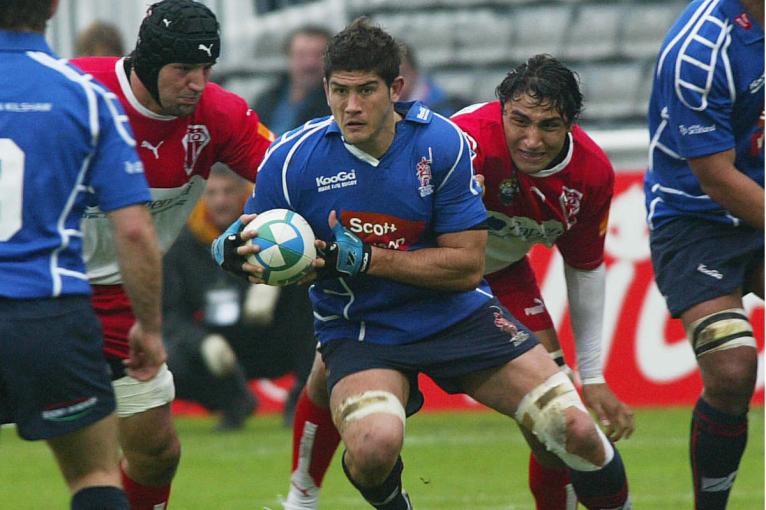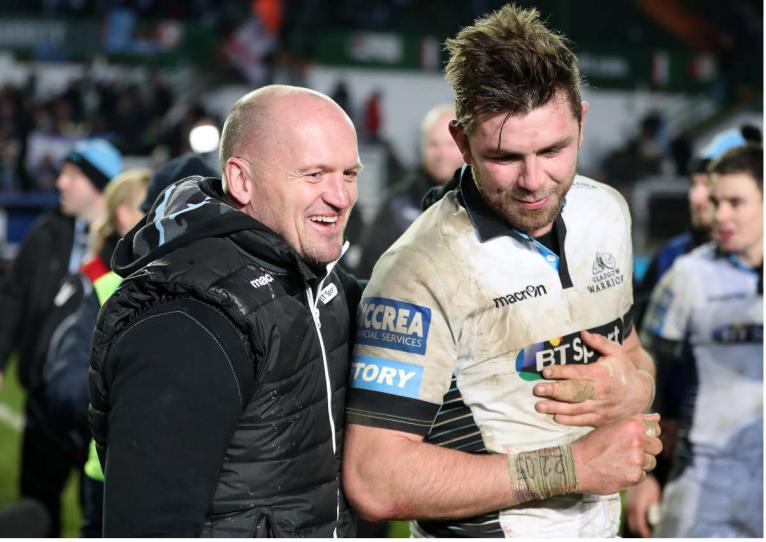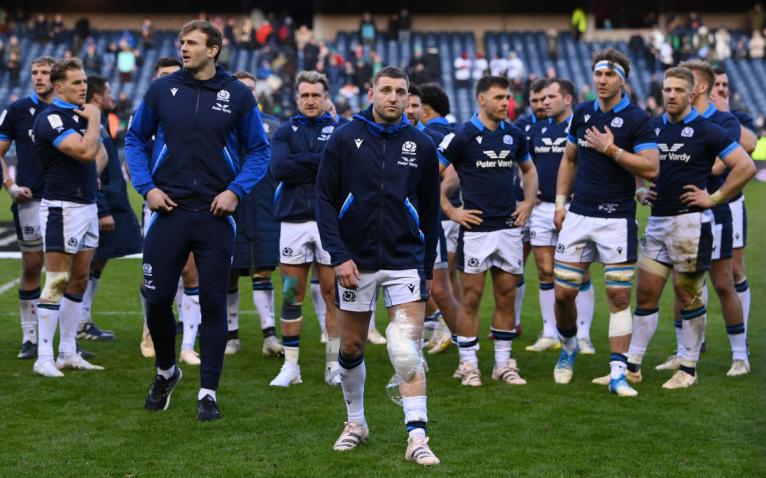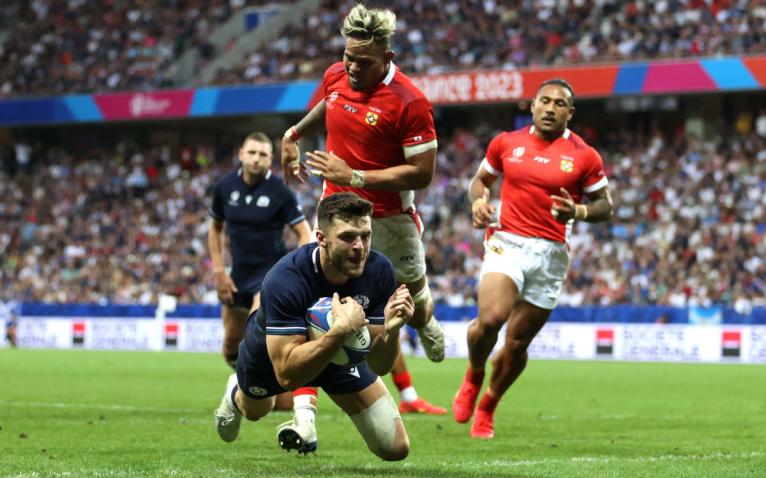Scotland have come a long way in the past decade and on Saturday in Paris they are hoping to both emulate a long-time friend and close the gap on the world’s best at the same time.
The Scots and Irish have long had a common friendship, Celtic cousins who eyed progress and success across the Irish Sea with a brotherly appreciation, for the simple reason that the countries were similar in size, with similar histories and approaches to their rugby. That meant that whatever ‘they’ did was eminently possible to emulate.
It is fair to say the Scots enjoyed more affection for their rugby cousins when Scotland dominated fixtures between the two. In the late 1980s and 90s Ireland managed just one draw in 12 years. Until 2000, Ireland had won 45 matches between the nations, and Scotland 60, with five Tests drawn. Now, it’s 69-66 in Ireland’s favour as the teams prepare to meet for only the third time in a Rugby World Cup (with one win apiece).
The reasons for the inspiring Irish resurgence of the 21st century are many and pretty well documented, but one simple but crucial aspect is an intangible synonymous with all levels of sport: confidence. Players, coaches, officials and supporters in Ireland layered confidence on top of hope and optimism year on year from 2000, through building evidence of an ability to win.
An irony is that the Irish looked to Scotland for inspiration back then and took a path that Scotland were already on, but abandoned. The late Garrett Fitzgerald was Munster CEO from 1999 until 2009, a powerhouse of a man as a front-rower – for Cork Constitution – and coach, steering Munster to victory over world champions Australia in 1992, but also as an administrator.

In conversation with him at Netherdale in Galashiels, when Munster were playing the Borders pro team, he asked why the SRU had scrapped the Borders team in 1998, after a short two-year spell, only to resurrect it in 2002. The answer was money, the SRU deciding they didn’t have enough of it to pay 160 players. As director of rugby, Jim Telfer was influential in the Borders outfit returning, but he had retired when the SRU decided again to cut it in 2007, to reduce the Murrayfield debt.
Fitzgerald was bemused by the thinking then in Scottish rugby that the future lay solely with Scotland’s cities, Edinburgh and Glasgow, and not the “traditional powerhouse”, as he termed it, of the South/Borders. Paraphrasing that conversation from memory, he told me: “We have modelled what we’re doing at Munster on what you’ve had in Scotland for decades. It’s about supporting our clubs at the grassroots, and that helps us to bring them together in a common Munster cause. And I believe that is the best way for us to develop the pro game in Ireland.” And, then, the key point: “It’s not all about money – it’s surely about building on the foundations you’ve had for a hundred years?”
Ireland players had a new belief to take on the best in the world. Of more interest this week is how much Scotland have managed to narrow the gap in recent years, and how close they are now.
What made that point moot to sceptics was that Ireland’s ‘tiger economy’ was roaring at the time, and business in the Emerald Isle would go on to play a massive role in developing pro rugby, while Scotland’s GDP was much smaller and government support for sport negligible.
Fitzgerald was a passionate and clever man, and he would help to steer Munster to three Celtic League titles and Heineken Cup triumphs in 2006 and 2008, and drive the redevelopment of Thomond Park and Musgrave Park – crucially recognising the need to invest in both Limerick and Cork to engage passionate people in the Munster cause.
Those periods did not come without conflict, but that Munster and Ireland stuck to its course inspired Leinster, particularly, to believe they could be the best in Europe. Munster had done it, so why not us? They rose to the challenge, on several occasions, and, with provincial talismen Paul O’Connell and Brian O’Driscoll driving the bus, Ireland players had a new belief to take on the best in the world. Players have come into the set-up since with belief and expectation firmly entrenched in the environment.
So, we know that. Of more interest this week is how much Scotland have managed to narrow the gap in recent years, and how close they are now.

There is no escaping the rise in confidence under Gregor Townsend. An ambitious, confident, world-class player, he took over as head coach at Glasgow Warriors in 2012, controversially, at just 39, making no secret that Irish provinces had set the benchmark. In his first three years the team would reach the Pro12 semi-finals, then the final, then win the title, comfortably beating Munster in the 2014-15 final in Belfast. That they beat Munster, coached by a friend, the late Anthony Foley, meant a lot to him. Though they lost in the semi-finals the year after and failed to reach the play-offs in his final season, Townsend signed off by making Glasgow the first Scottish side to reach the European Cup quarter-finals. His 62% win rate across all competitions was better than anyone had managed before.
Why would we put in a target of reaching the quarter-finals or semi-finals? This is about being aspirational. If we can reach that stage, we should be able to win it.
Gregor Townend on the World Cup
Townsend left in 2017 to take charge of Scotland, another move critics questioned as being premature, particularly as Kiwi Vern Cotter was doing a good job of making Scotland competitive again. Townsend kept his counsel publicly, but told the players that he wasn’t interested in ‘being competitive’, that their focus was on emulating Ireland’s rise and beating the top nations in world rugby. He was asked for input to a new SRU strategy which was published with Scotland’s aim being to win the World Cup. It was openly mocked, suggesting Scotland were getting ahead of themselves, but Townsend’s response was: ‘Why would we put in a target of reaching the quarter-finals or semi-finals? This is about being aspirational, and if we can reach that stage, we should be able to win it.’
His side beat Australia 24-19 in Sydney on their first tour, the first of three defeats of the Wallabies, came within a minute and a few metres of beating the All Blacks for the first time. They have beaten England four times, and drawn once, out of six meetings, including a first win at Twickenham in 38 years, and won the last three on the trot. They have also beaten France five times, Argentina regularly, Wales in Wales for the first time in 20 years and won eight from eight against Italy. But he has not managed a win against Ireland, with eight defeats from eight meetings in his tenure, averaging 12 points to Ireland’s 35.
Looking more closely at those eight games, most have been tight affairs, even when the margin of victory was large: 20 points separating the sides in 2018, nine in 2019 (but 24 in the World Cup that year), seven in 2020 (when Stuart Hogg dropped the ball over the line), three in 2021 and back to 15 this year.

Scotland’s try-scoring rate has doubled in that time, with genuine threats across the field. We can analyse to death how Scotland might, or might not, escape the Irish pincer movements, their power at the breakdown and well-oiled attacking machine whether through the forwards or backs, which remain significant points, but the big question ahead of this weekend is: do these Scottish players all believe they can beat Ireland? If not, they won’t.
One former player who never lacked belief in a navy jersey, and regularly confounded sceptics, is Andy Irvine. He believes a tangible gap still remains, but also that Townsend’s team is closer than any of the past 20 years to closing it. He points to the courage and daring that did for England in that stunning Six Nations comeback in 2019, from 31 points down, as his evidence.
“Look, obviously, this is going to be a hell of a game,” said the legendary former full-back, known for his daring counter-attacking. “Ireland will be strong favourites for obvious reasons, but in some ways that’s not a bad thing for us, to go in as the underdog. I would say this is probably as good a Scottish team as we’ve had in the last 25 or 30 years. It’s also one of the greatest Irish teams we’ve had in a long time.
“It was a great shame that three of the top five teams in the world were in the same pool, but there’s nothing we could do about that. Now, it’s in our hands – win by eight points or more and we’re through [Scotland need to win while denying Ireland a bonus point, or else claim a bonus point and limit Ireland to one].
“I’ve read people writing Scotland off, and that’s fine, because a win in Paris is possible. We’re exceptionally well coached, there is a great team spirit in this squad and we play a fantastic brand of rugby that is difficult to defend against, so I think it’ll be a cracking game.
Much focus is naturally on the conductor at 10, Finn Russell, but Irvine believes his old position will be key in the Stade de France, with Blair Kinghorn’s work in space with wings Darcy Graham and Duhan van der Merwe piercing the Irish defences.
“Ireland don’t have many weaknesses – they’ve got a solid scrum, a damn good lineout, a big, quick back row and are very good defensively. They’re a potent attacking side, as you would have to be to reach number one in the world. And they’ve got a great record going into this game.
“But there is some genius in this Scotland side we haven’t seen before. I think what we will have to do is exactly what we did at Twickenham three or four years ago, when we were absolutely bombed out at half-time and we just went out, ran absolutely everything and were brilliant. We ended up getting a draw, but we should have won.
“That’s the best second-half performance I’ve seen by any team, not just by Scotland, and it shows what this team are capable of. In the four years since we have improved, with more threats coming through, and if we can replicate that kind of performance, we will win.”
Much focus is naturally on the conductor at 10, Finn Russell, but Irvine believes his old position will be key in the Stade de France, with Blair Kinghorn’s work in space with wings Darcy Graham and Duhan van der Merwe piercing the Irish defences.

“I’m passionate about Scotland, obviously, and as much as we’ve improved, so have Ireland, so we know there is still a gap. But this Scotland team has been surprising people for a while now. What I love about them is that they play a great brand of rugby that exposes the best defences; they’re not a dull, boring side and that gives them a real chance in Paris.
“I’m going to the game and I’m really looking forward to it. I love Paris as a city and I loved playing there, and the atmosphere will be absolutely tremendous. I hope the game doesn’t hinge on a 50-50 call by the referee – I feel sorry for the refs right now because there are very difficult decisions to make in the current game.”
But do they have the ability and confidence to emulate Ireland in the best of ways, by beating them when it matters?
“I don’t know, but what I will say is that there’s absolutely no doubt that if we get through to the quarter-finals, it’s because we’ll have played one hell of a game. And this team has a bit of a record of those.”


Scotland have nothing to lose it’s either them or Ireland
As an observation... the emergence of the Irish national team seems related in no small part to the work of Joe Schmidt. Prior to his tenure, Irish provinces and teams and sometimes even a test team would put in impressive results but it seems (from the outside) the "force" that is now Ireland happened with the processes and belief instilled by Joe and his coaching team. It has now gone on to new levels but as a kiwi, the writing was on the wall that this was a different Ireland after their first ever success against the ABs in Chicago.
I think Ireland will step it up for a convincing victory against a strong Scotland team to set up a game for the ages against the mighty All Blacks.
C'mon Scotland! Scotland to win by 10